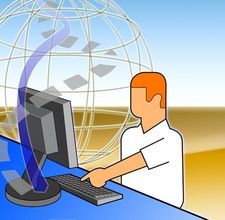|
News Articles on the Future of Education
(back to top)
- Sept. 26, 2012: "Wesleyan to Offer Free Online Courses through Coursera."
Wesleyan was one of 17 universities that joined the project on Sept. 19, bringing the total to 33. In the first 24 hours after joining, 10,000 people signed up for Wesleyan's 5 MOOCs (Massive Open Online Courses).
- "UC Online Program Gains Momentum," Oct. 2012 press release about the state and nature of online education in the University of California system.
- "What’s Digital Pedagogy?," Brian Croxall's website for an "unconference" at the Jan. 3, 2013 MLA meeting. Short reflection with lots of links showing the breadth of what can be considered digital (electronic, which can often be readily converted for online delivery) teaching approaches.
- "What you (really) need to know," New York Times, Jan. 20, 2012, by Laurence Summers (former Harvard president and US Secretary of the Treasury -- and misogynist).
Summers describes 6 ways 21st century education will be different than in the past. They can be subsumed under: education will be "more about how to process and use information and less about imparting it." Open-source textbooks, greater emphasis on collaboration, the lowering of language barriers, and the need for data (information) analysis skills are among the consequential changes he anticipates.
- "Harvard Conference Seeks to Jolt University Teaching," Chronicle of Higher Education, Feb. 5, 2012.
Are conventional teaching approaches--like lectures--ineffective? How might one better 'prod students to make meaning from what they learn, to ask questions, extract knowledge, and apply it in a new context'? Myth of visual vs. auditory etc. learning styles is debunked, and testing is shown to be an effective means of increasing information retention.
- "Why Pay for Intro Textbooks?," Inside Higher Ed, Feb. 7, 2012.
On recent developments in the movement to create open-source textbooks.
- "Marketing to the MOOC Masses," on Elsevier publisher's partnership with EdX to offer a (somewhat restricted) digital version of its textbook free to students, in: Inside Higher Education, Sept. 26, 2012.
MOOC stands for "massive open online course." There are various incentives to use this free version to increase sales of the hard copy textbook.
- "In the Digital World, Every District Can Compete with Every Other," Education Next, Feb. 9, 2012.
In a Utah pilot program high school students dissatisfied with a course at their school can opt to take an online version instead.
Outside providers can be contracted to offer such courses.
- "MIT launches free online 'fully automated' course," BBC News, Feb. 13, 2012.
This "MITx" project takes placing course materials online to a whole new level.
See also MIT's own article on the course, including faculty reactions.
- "University 2.0:" Sebastian Thrun (former Stanford professor), describes in 22:47 YouTube clip how putting his lectures online (inspired by the Kahn Academy), enabled him to reach many new students (with testimonials), so he has left Stanford to start teaching for free online. From a DLD (Digital - Life - Design) 2012 conference, Jan. 23, 2012. The website Thrun is using to present his computer science classes is www.udacity.com.
|
